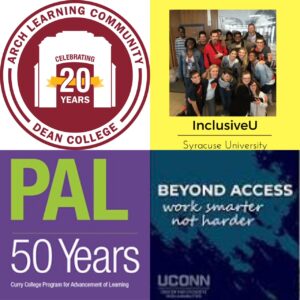While more students with learning disabilities are attending college the overall graduation rates continue to be relatively low. One of the theories for this could be that students attending schools that don’t offer nearly enough support either because they were unaware of all the colleges that have structured support programs or the high cost associated with them. I agree with this theory and feel through my experience that for graduation rates to increase, resource room teachers, counselors, and parents need to do more research into colleges with structured support programs for both mild and severe learning disabilities. The reality is many disabled students need more than basic support which is reasonable accommodations only (such as extended time for tests) this is especially true for students with an NVlD given many have social communication deficits.
 For example, our high school resource room teachers and counselors didn’t know that structured support programs existed until I shared my plans, which was so discouraging. Our local college SUNY Canton was the most common recommendation, and it wasn’t a good choice for many as the college just offered basic support. This meant that students just received the federally required accommodations. If you needed tutoring services you needed to set it up on your own as it isn’t a mandated accommodation. For a high percentage of students, this was very challenging as they were so used to having a high level of support in high school. Consequently, I can see how graduation rates are much lower at schools with basic support for students with disabilities.
For example, our high school resource room teachers and counselors didn’t know that structured support programs existed until I shared my plans, which was so discouraging. Our local college SUNY Canton was the most common recommendation, and it wasn’t a good choice for many as the college just offered basic support. This meant that students just received the federally required accommodations. If you needed tutoring services you needed to set it up on your own as it isn’t a mandated accommodation. For a high percentage of students, this was very challenging as they were so used to having a high level of support in high school. Consequently, I can see how graduation rates are much lower at schools with basic support for students with disabilities.
As a result of my parent’s knowledge about the different levels of disability support available at college, I attended Dean College and their Fee Base ARCH Program. Here I received three hours a week of structured ARCH Learning Services and 45 mins per week of ARCH Counseling with the director, a copy of notes, and extended time. Also, our First Year Seminar class was ARCH-only students and the director co-taught the course in the beginning so we could learn how to set up our accommodations and become better self-advocates. In addition, the ARCH program included peer mentor services which made being socially connected much easier. This resulted in many success stories as the ARCH team was there every step of the way to make sure their students succeeded.
Through experiencing this success at Dean College I continued to Curry College where I received coordinate support, a level of support below comprehensive. This was still good support as my schedule included Monday and Thursday check-ins with the disability coordinator so I could go over my assignments with him and he could make sure I was receiving all of my accommodations. If problems arose he would help you connect with the appropriate essential skills center tutor who made it easier for you to get through your challenges. So through my experience, I know this level of support also lowers the chances of falling through the cracks.
Attending colleges with just basic support also brings lesser results to those who have more Executive Functioning deficits than traditional academic challenges. These include individuals with higher-functioning Autism and NVLD along with ADD/HD. Receiving lower grades and the challenges of having to take full ownership can affect these even more with how in high school many of these students through resource room support were able to get grades that were more of a true reflection of their ability. So, if more disabled students chose a college with structured support less would likely give up as a good percentage do, despite often being very bright they need assistance with time management, organizational skills, social skills support, and developing proper communication skills with their professors. This was true, especially for the first year of college to achieve grades that reflect their true ability. Yet most school counselors, resource room teachers, and parents feel they would do just fine with basic support. This isn’t always the case as each disability brings its challenges so regardless of how selective the college is, every structured program shares the same goal of being able to do whatever it can to make sure its students succeed.
Now to end in Part A it is also important to remember that your level of determination and work ethic also determines how well you will do in college. That being said, through my own experience and knowing other learning-disabled students I strongly believe that a big reason for lower graduation rates for students with Learning Disabilities is a result of students not picking schools that can’t accurately support their academic and social needs as a good percentage need at least coordinative services to achieve their true potential.
Eileen
Eileen is a Project Social Ambassador and blogger for The NVLD Project. She loves helping others understand they can achieve their goals and dreams through hard work and dedication.







